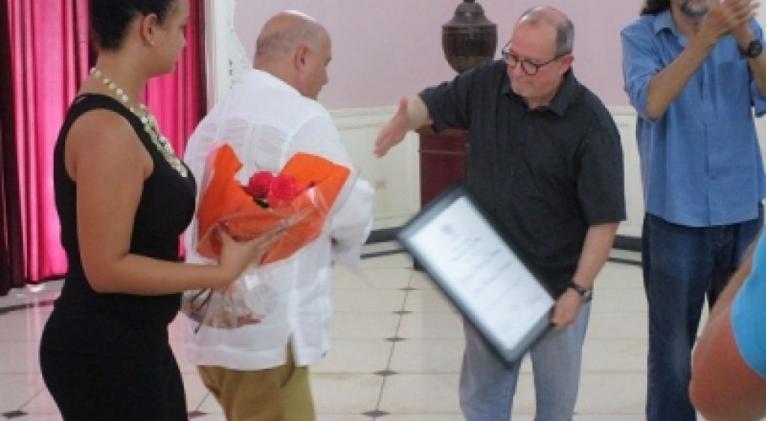The title acknowledges the huge work by the singer-songwriter, example for hundreds of artists graduated from the teaching institution.
Silvio Rodríguez needs no academic recognition to guarantee a privileged place in Cuban culture, but of course, he deserves so. Cuban Arts University (ISA) has named him Doctor Honoris Causa on Tuesday, in acknowledgement to a huge work, which has been reference for hundreds of artists, many of whom have graduated from this house of higher studies.
Alexis Seijo García, rector of that university, highlighted the artist’s performance and his contributions to Cuba’s song and lyrical poetry that makes the singer-songwriter “a Cuban music icon”.
The ceremony took place just the day of the 50th anniversary the musician’s debut on Cuban Television. Silvio recalled so in his words of thanks, in which he also congratulated the artistic teaching system that is celebrating 55 years these days.
The fact that the University of Arts has just granted him the title has meant a lot for the singer: “Many of my fellows, excellent artists from all manifestations studied here. This ceremony, somehow, unites me more with them”, said the musician in an encounter with the press.
At the ceremony, Silvio also received a painting by Cuban painter Alicia Leal, and a large standing ovation from the audience, composed of personalities from Cuban culture and representatives from the Ministry of Culture —headed by Minister Abel Prieto Jiménez— and the Hermanos Saíz Association (AHS), professors and students from the University of Arts.
Silvio Rodríguez has been the troubadour, poet and chronicler par excellence of a booming and intense time. Hence his teaching. Generations of Cubans have made those songs their own, since they are part of the essential soundtrack of a Revolution of the arts and thought.
WORDS OF GRATITUDE FROM SILVIO:
Silvio Rodríguez reads out his words of gratitude. Photos: Octavio Fraga
Havana, Tuesday, June 13, 2017.
Dear friends:
As I come from the street, from life, I often wish to talk about the difficult, complex thing, about all the questions that we Cubans are necessarily asking ourselves. In that extent, I am not very different from the boy who wrote long ago:
What learned silence preserves our life?
What timely silence makes us wise?
What murderous silence fills up our belly?
How many times a day do we deserve death?
But life is rich, diverse and especially generous in our country. It also invites to congratulate Cuban artistic teaching system –the giants who dreamed and made it possible, its workers and students–, this University of Arts that discriminates nobody, all the deeply beautiful thing that celebrates 55 years these days.
I am turning a bit less: barely fifty revolutions of earth around the sun, a Tuesday 13 like today, at this same time I was at Estudios 19 in Focsa rehearsing the themes I was going to lip-sync in the evening at the “Music and Stars” program.
Guillermo Rosales, a former fellow from Mella Weekly, had taken me to the house of Mario Romeu, and this extraordinary musician had decided to orchestrate two themes for me and to seat me before the TV cameras.
Amazingly, the day before I was released from the military service after more than three years. I remember that the only shoes I had were my Russian boots, which of course, went on the air too.
In this half-century, I think I have managed to learn something from my job, from stubbornness rather than from trade. I also learned that the rejections and criticisms that hurt the most are the ones coming from the family, from those we love, from the country itself. Likewise, the hugs that excite the most.
The truth is that I could tell many things, I fear that too many. I have knocked it around so much that I could have started with an apocryphal verse: “I waste a lot of paper thanking”. Fortunately, my dear wife gave some advice: “What you make are songs, sing one”… However, because of the time and the respect for this audience, I will skip the music and only recite the simple words from a song I composed years ago:
La Escalera
Iba silbando mi trino
por una calle cualquiera,
cuando a un lado del camino
me encontré con la escalera.
Era una escala sencilla,
de rústico enmaderado,
desde la calle amarilla
hasta el rojo de un tejado.
“¿Qué se verá desde el techo?”,
Dijo la voz de lo extraño.
Y sin meditar el trecho
le puse afán al peldaño.
La brisa me acompañaba
en el ascenso y el alma,
y mi camisa volaba
junto al sinsonte y la palma.
Mientras más ganaba altura,
la calle me parecía
más pequeña, menos dura,
como de juguetería.
Y sucedió de repente
que, después de alimentarme
con la visión diferente,
solo quedaba bajarme.
Dejé la altura en su calma,
dejé el cielo en su horizonte.
Siguió batiendo la palma,
siguió volando el sinsonte.
Me encontré con la escalera
cuando a un lado del camino,
por una calle cualquiera,
iba silbando mi trino.
Thank you very much!
Translated by Jorge Mesa Benjamin / Cubasi Translation Staff















Add new comment